Top Certificate Programs for Quick Employment in 2025–26
Students entering today’s labor market are seeking fast, flexible pathways into stable careers. Top certificate programs for quick employment in 2025–26 continue to gain momentum because they offer short training timelines, industry-recognized credentials, and strong employer demand. Community colleges have become central to this shift, offering accessible options aligned with labor shortages in healthcare, technology, skilled trades, transportation, and business operations.
This guide reviews the top certificate programs for quick employment in 2025–26, how they align with current hiring trends, and what students should consider when choosing a program. It uses recent job market data, expert commentary, and community college best practices to help learners make informed decisions.
Why Top Certificate Programs for Quick Employment in 2025–26 Matter
Families and adult learners increasingly prioritize training that leads directly to employment. Several factors drive the rise of top certificate programs for quick employment in 2025–26.
Key trends include:
Rising demand for middle-skill workers in healthcare, manufacturing, clean energy, and logistics
Growing acceptance of skills-based hiring over traditional four-year degree requirements
Ongoing worker shortages in high-growth sectors
Increased federal and state investment in workforce development
According to workforce analysts at the National Skills Coalition (nationalskillscoalition.org), industries that rely on middle-skill talent continue to outpace the supply of trained workers. Certificate



















